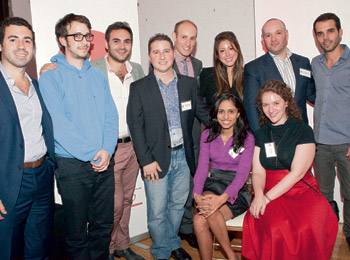So here’s another great idea that comes out of Israel: you’re watching a music video and you get to choose how the video plays out. Instead of a linear progression determined by the director, the video producers have integrated numerous variations in the narrative and left it up to the viewer to choose which they prefer.
The variations, if not endless, are numerous. One music video of his band, demonstrated by Yoni Bloch at the 2010 Techonomy conference in Israel, featured 256 variations. Viewers could choose which person sings a solo, who the camera follows and more.
Bloch is naturally excited by the interactive technology, but he’s convinced its application goes way beyond music videos. TV shows, movies and educational programs all are candidates for the technology, he said.
Bloch, 31, along with his “computer geek” band mates developed the software that makes the technology operate, and he’s incorporated a company, called Interlude, to bring it to market.
He was in Toronto last week as part of Raw: A Forum for Fresh Ideas, sponsored by the Centre for Israel and Jewish Affairs (CIJA). The event brought together local entrepreneurs to meet Bloch and Gary Lipovetsky, president and co-founder of Dealfind. Dealfind offers subscribers daily discounted retail opportunities. Technology maven and author Marc Saltzman hosted the event.
With his blue hoodie and ready smile, Bloch looks more like a rock fan from the Annex than a successful businessman – he gets excited when he describes his favourite band, the Pixies, as well as the Canadian indie group, Mother Mother, that he follows.
But it’s a fact that technology firms are beckoning him, and in Interlude’s year or two in business, “we’re cash-flow positive and we’re in the millions in revenue. It’s been a good year,” he said.
Interlude’s interactive technology attracted the interest of Sequoia Capital, a venture capital firm that invested $3 million in the company. Interlude’s customers include heavyweights such as Nokia, Intel Microsoft and Old Navy.
As for the rock-star element, Bloch has two Israeli gold records to his credit. It’s not a big deal, he said rather modestly. In Israel you need to sell only 2,000 records to qualify. Bloch has also served as a judge on the Israeli version of American Idol, and MTV has twice given him awards for the most innovative music videos.
Bloch has always been ahead of the curve when it comes to innovation. In the late 1990s, when he was just getting started in the music business, he uploaded his songs to New Stage, an online archive of Israeli music and prose that preceded MySpace by about six years. One of his fans was the daughter of a senior record company executive. Her influence helped him get a record contract.
“I’m the first artist in the world to get a career started from the Internet,” Bloch said.
Bloch considers himself part of a new generation of musicians who feel equally at home discussing art, technology and business.
He comes by his interests honestly. When he was five, his father, a physicist, bought him a Commodore 64 computer, while his mom, a painter, got him a piano. In his own way, Bloch represents the synthesis of both worlds.
That reflects something very special in Israel, Bloch said. “We don’t do only one thing.”
Not only does he play music, he also writes computer code and understands the business part of bringing it all to market.
Two and a half years ago he decided to create his own interactive music video. The concept took off because viewers enjoy altering the course of the story to suit them. What’s more, the transitions are “seamless. They say the eyes blink, but ears do not,” he said.
* * *
Saltzman recently returned from his first visit to Israel as part of a small group of technology reporters invited there by CIJA. They visited startup companies, toured the Technion and explored the country’s famed historical sites.
“I don’t think many Canadians realize Israel is a startup nation,” he said, referring to the book, Start-Up Nation, which outlines the country’s success in developing new technologies and bringing them to market.
Many blue-chip American tech companies have located in Israel, and many technologies incorporated in devices we take for granted, including computer chips and the Xbox, were developed there.
One of the technologies he witnessed allows people through eye and head movement to turn pages on a tablet ebook and otherwise control content in an open application.
Called Umoove, it has tremendous implications for people suffering physical challenges, such as ALS patients, but it no doubt will see wider applications including games, Saltzman said.
Saltzman believes there are a number of reasons behind Israel’s tech creativity:
• Israel is an island surrounded by hostile neighbours and to survive Israelis have developed the drive to succeed on a global scale.
• During young people’s army service, “they learn a lot and they use cutting-edge technology. They have access to high tech at a young age.” The networks created in the army can later be helpful when they go into business, Saltzman said.
• Israelis have chutzpah. “That ties into them being an island in a sea of hostility… Those who drive and push forward and kick down doors are often the ones who succeed.
• It’s okay to fail in Israel. The national culture doesn’t see failure as a deterrent to future success. Quoting Israeli venture capitalist Jonathan Medved, he said, “Israelis eat risk” and have a drive to succeed.
That’s something Bloch can relate to. “In general, Israelis are very competitive. They all grow up in a small dot on the map, surrounded by enemies. We have dreams of doing big things,” he said.
As for Interlude, “we want to be the standard of interactive video, but we want interactive video to be the standard” [in video], he said.
